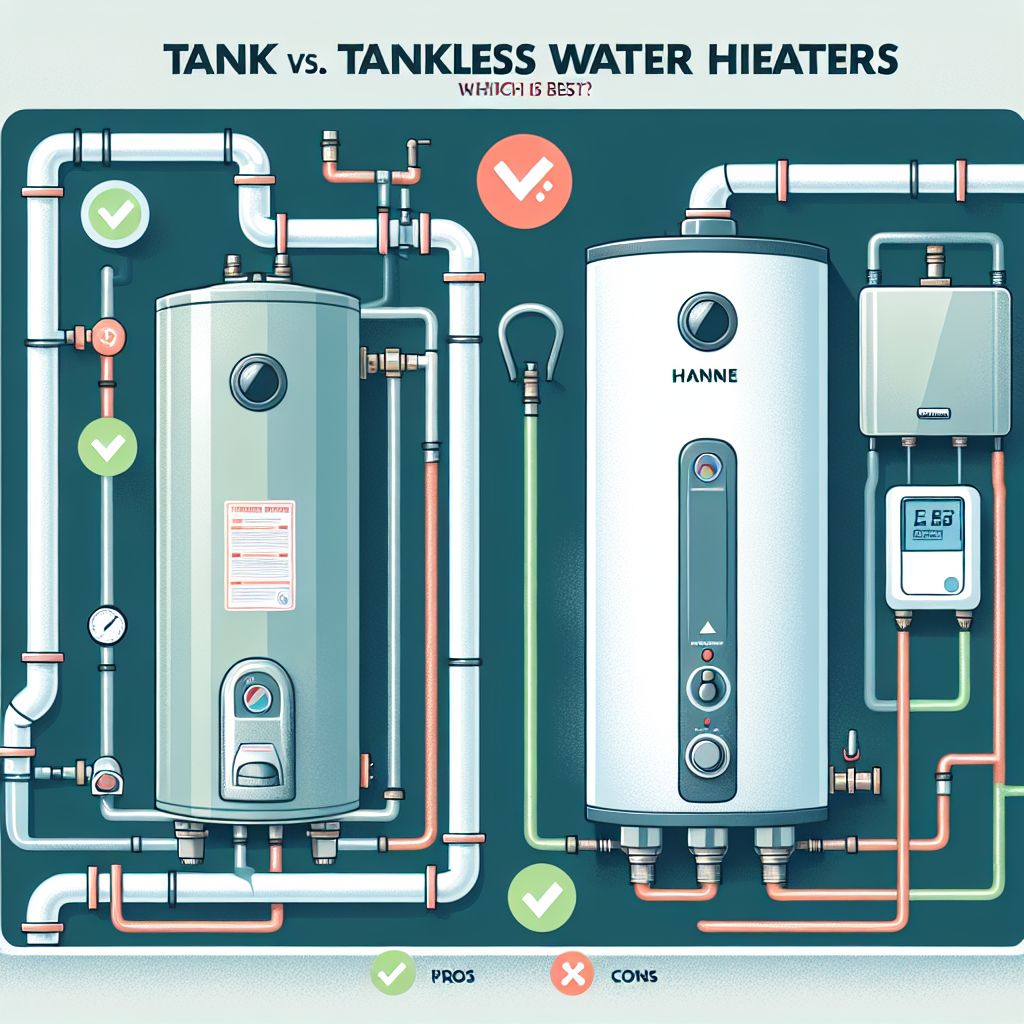When it comes to selecting a water heater for your home, two main options typically come to mind: tank and tankless water heaters. While both serve the purpose of providing hot water, they operate in significantly different ways. In this article, we’ll explore the pros and cons of each type, helping you make an informed decision based on your specific needs.
Understanding Tank Water Heaters
How They Work
Tank water heaters, often referred to as traditional or storage water heaters, store a predefined amount of water—typically ranging from 20 to 80 gallons. When hot water is needed, the heater draws from this reservoir, and once the stored water is depleted, it will take time to refill and heat more water.
Pros of Tank Water Heaters
-
Lower Initial Cost: Generally, tank water heaters come with a lower price tag than their tankless counterparts, making them a budget-friendly option for many households.
-
Simplicity: Their straightforward installation process makes them a popular choice among homeowners.
- Availability of Hot Water: Since they store hot water, there is a ready supply of hot water, making it ideal for households with high hot water demands at peak times.
Cons of Tank Water Heaters
-
Energy Inefficiency: Tank water heaters continuously heat water to maintain the desired temperature, leading to potential heat loss and higher energy bills.
-
Limited Supply: Once the tank empties, you may face a wait time for it to refill and reheat, which could be inconvenient during peak usage.
- Bulky Space Requirement: They tend to take up more space than tankless models, which can be a concern in smaller homes.
Understanding Tankless Water Heaters
How They Work
Tankless water heaters, also known as on-demand water heaters, provide hot water only as needed. When a hot water tap is turned on, cold water travels through a pipe into the unit, where it is heated by either gas burners or electric elements.
Pros of Tankless Water Heaters
-
Unlimited Hot Water Supply: Because they heat water on demand, you’ll never run out of hot water regardless of how many showers you take.
-
Energy Efficiency: Tankless models are known for their energy efficiency since they don’t require standby heating. This can result in lower utility bills.
- Space-Saving Design: These units are typically compact and can be installed in smaller spaces, making them an excellent choice for apartments or homes with limited space.
Cons of Tankless Water Heaters
-
Higher Initial Cost: The upfront cost of a tankless water heater is generally higher than that of a traditional tank model. Additionally, installation may require modifications to your existing plumbing and electric or gas lines.
-
Requires Sizing Considerations: If your household has high hot water demands, you may need multiple tankless units to meet those needs effectively.
- Delayed Hot Water: There can be a short delay from when you turn on the tap until the hot water reaches your faucet, which might be a downside for some homeowners.
Which Is Right for You?
Consider Your Household Size and Hot Water Needs
For larger families that require substantial hot water, a traditional tank model may provide the reliability needed to avoid arguments over who gets to shower first. Conversely, if you live alone or in a smaller household, the tankless option may offer sufficient hot water while saving on energy costs.
Evaluate Your Budget
Think about your initial and long-term costs. While tank water heaters are less expensive to purchase, a tankless model may save you more money over time due to its energy efficiency.
Space Considerations
If you have limited installation space, tankless water heaters are a more fitting choice due to their compact size.
Conclusion: Making Your Choice
Choosing between tank and tankless water heaters ultimately depends on your specific circumstances. Both types have their advantages and drawbacks, and understanding them will guide you to the decision that best suits your household’s hot water needs, budget, and space allowances. Whether you opt for the traditional reliability of a tank system or the modern efficiency of a tankless model, the key is to choose what feels right for you and your home. Remember, it’s always a good idea to consult a professional plumber to help you navigate your options!
By weighing the pros and cons of each system and considering your unique needs, you’ll find the best solution to ensure your home always has the hot water you need.


